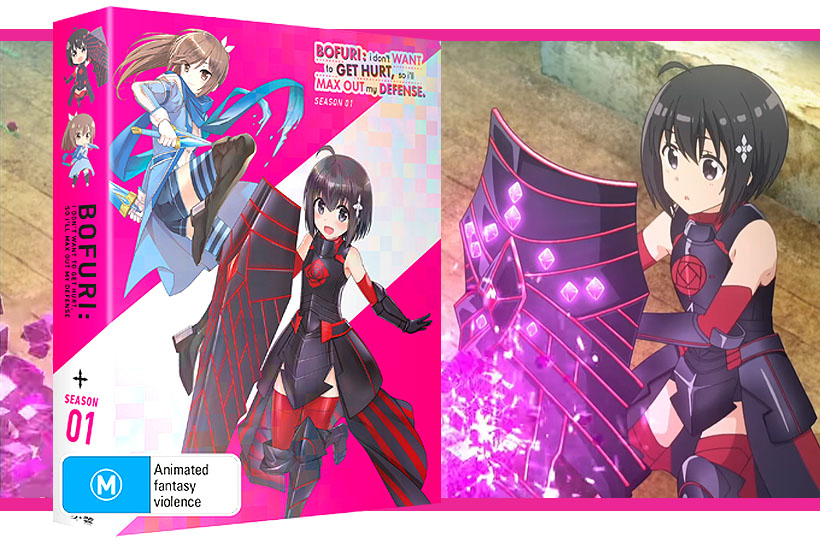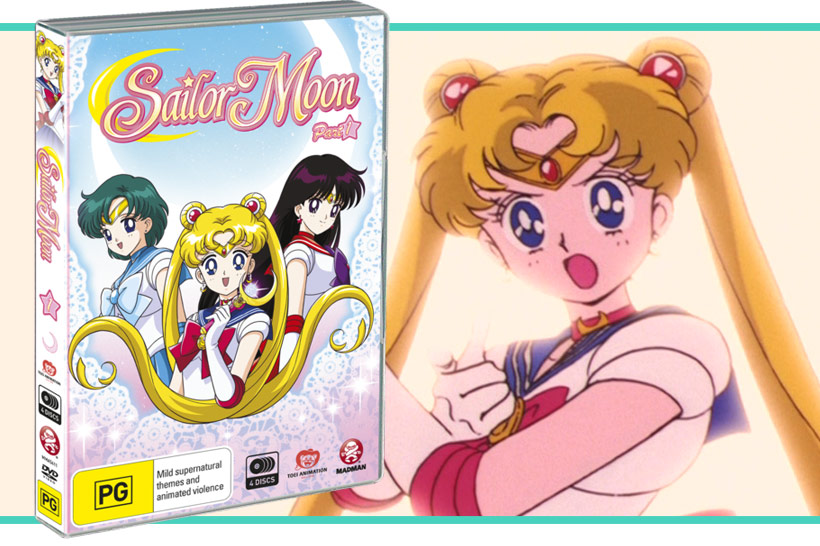When Kaede’s friend Risa convinces her to start playing the virtual reality MMORPG NewWorld Online, her lack of gaming experience results in Kaede pumping every single one of her skill points into her defence stat to avoid getting hurt. Entering NewWorld Online under the username Maple, she discovers that maxing out her defence has left her other skills non-existent, including having no magical ability and no dexterity, which greatly impacts her movement speed. Despite this, Maple’s decision to max out her defence has worked better than expected – she can easily take hits from enemies without taking damage. Her high defence stat paired with a can-do attitude and a logical approach to problem solving (and a little bit of luck) results in Maple earning some incredible items and skills that propel her into the ranks of NewWorld Online‘s top players and draws the focus of the game’s online community.

Bofuri: I Don’t Want to Get Hurt, so I’ll Max Out My Defense is based on a light novel series of the same name written by Yuumikan, and joins the ever-growing list of virtual reality MMORPG shows permeating the anime landscape. However, in a landscape producing a steady stream of Sword Art Onlines, Log Horizons, and numerous fantasy world series borrowing the MMORPG aesthetic, it becomes easier to set yourself apart by picking a gimmick and running with it. This is the case with Bofuri, whose selling point is simple – what happens when a player dumps every skill point they earn into defence? The result is a fun and goofy series that follows Maple adapting to (and sometimes breaking) the rules of NewWorld Online as she increases her defence stats and acquires skills and items that give her more and more buffs and abilities that make her a force to reckon with and give her a fame bordering on “legendary but lovable cryptid” within the gaming community. The series leans on this as its main concept for laughs but doesn’t rely on it exclusively, and incorporates other elements of NewWorld Online for the characters to explore such as forming guilds and taking part in events, while also including the perspectives of the game developers and the online community watching the events around Maple unfold. Subsequently, Bofuri is gimmick-y enough to stand out, but that doesn’t get bogged down in its initial concept and keeps things varied enough to stay interesting.

The MMORPG aspects of the series are also very endearing – the focus on maxing out stats and exploring different ways to play the game is fun, but there are a lot of details in Bofuri that are sure to entertain those familiar with games and MMORPGs. There are elements of speed-running boss fights, side quests that acknowledge the familiar RPG experience of taking a quest only to have the required quest item in your inventory already, and when game developers nerfing abilities after it is discovered they are imbalanced or too over-powered. Poking fun at the shared experience of MMORPG players is an opportunity often missed in this genre of anime, so it was always fun to see these moments in Bofuri.
Bofuri portrays a fluffy and idealised version of what it means to play an MMORPG – it depicts the simple pleasures of hanging out with friends, sharing discoveries, befriending new people, and forming a community through participating in events and forming guilds. While Maple and her friends fighting powerful enemies can be tense, the tension is that of fighting a tough in-game boss and not wanting to lose and start again or not wanting to let down the team. With Maple and her friends obtaining more and more power and abilities as they progress through the game, it’s very rare that the characters face an enemy where it feels like the enemy can overpower them. This didn’t bother me during my viewing of Bofuri because this fluffy, low-tension approach to conflict is the series’ style – it’s a show about a bunch of friends mucking around and having fun while playing their favourite MMORPG. This is emphasised by the main conflict that arises at the end of the series being fairly light-hearted as well – Maple and friends compete in a guild event and want to be one of the top-ranked guilds on the scoreboard – not the winners mind you, they just want to be on the top scoreboard. Of course, this is no simple feat and requires strategic planning and preparation on behalf of the characters, but it gives you a good indication that Bofuri‘s primary motive is revelling in the fun of online gaming, and not delivering a grand drama. And honestly, nothing probably emphasises the importance Bofuri places on fun more than its depiction of the online gaming community watching Maple rise through the ranks of NewWorld Online, cheering her on from the sidelines as they enjoy the spectacle of her achievements.

A Limited Edition of Bofuri is also available from Madman, and features a bunch of goodies, including a 120-page art book, six art card prints, a sticker, and a gaming playmat. The series Blu-Ray case and art book also come in a collectable case with a vibrant cover that captures the cutesy and fun vibes of the show. My personal favourite inclusion from the Limited Edition is the art book, which is packed with character art, background and item designs, and a series of gorgeous illustrations of the separate characters and the group art of the different guilds. A light novel is also included in the book, “Defense and Days Prior” which sheds some light on the origin of Kaede and Risa’s friendship and the events leading to the beginning of Bofuri. If you’re umming and ahing over whether to get the limited edition, check out Madman’s unboxing video which shows off everything included in the pack:
Bofuri is a fun and fluffy series that has a lot of love for MMORPGs, which it shows through its quirky gimmick of maxing out the defence stat and poking fun at familiar MMORPG experiences and concepts. At 12 episodes, the show is able to lean into its gimmick without overstaying its welcome – while it’s nothing too deep, it’s simple but effective and focuses on the fun, which is everything Bofuri promises from the first episode.
A review copy was provided by Madman Entertainment to the author for the purpose of this review.





